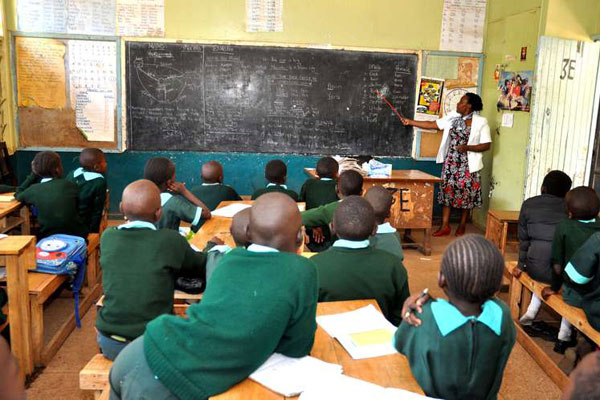Exams in CBC Curriculum: Grade Three pupils will sit a national exam at the end of the year before joining Grade Four.
This is according to the new Competency Based Curriculum. Kenya National Examinations Council (Knec) acting CEO Mercy Karogo said the national exams in CBC Curriculum will be done at the end of each tier of education in the 2-6-3-3-3 system.
“At the end of Grade 3 this year, learners will sit Kenya Early Years Assessment (KEYA) exam to be administered in three assessments of English, Mathematics and Integrated Learning Areas, an assessment that integrates knowledge from different disciplines,” said Dr Karogo yesterday.
The new system covers pre-primary and Grade One up to Grade 12. Early Years Education (EYE) covers nursery education to Grade Three while Middle School Education will cover Grade Four to Grade Nine. Senior School will cover Grade 10 to Grade 12.
Karogo, who was addressing teachers undergoing training on CBC in Machakos, said they had developed a Competency Based Assessment Framework (CBAF) to be used in the assessment.
“Learners will be assessed using a portfolio assessment for about two months. Portfolio is a purposeful collection of learners’ work that shows effort, progress and mastery of a specified learning outcome or competency. It provides evidence of progress and achievement or mastery,” said Karogo.
She added: “The ongoing education reforms call for a paradigm shift in the mode of instruction and consequently assessment, with emphasis on the use of key inquiry questions for each topic.”
Karogo said learners will be engaged through critical thinking on issues rather than just recalling information.
“This therefore calls for a shift in the way we assess. Assessment will be more of a process of determining the capability of a learner to apply the knowledge, skills, attitude and values as they perform tasks,” said Karogo.
She said emphasis will be on formative assessment carried out continuously during the learning process, and teachers will need to nurture a learner’s potential by making use of variety of assessment methods.
“Apart from written tests, teachers can embrace use of oral tests for language proficiency, observation schedules as learners engage in learning activities, use if rubrics that give a qualitative description of what a learner is able to do, use of projects in a small way and use of portfolio assessment to gather evidence of learning over a given period of time,” said Karogo.
She said CBC will focus on assessment on tasks that relate to everyday life experiences to ensure learning is not on abstract things and exercises given should be ones the learner identifies with.
“Use of key inquiry questions will help learners acquire the higher order thinking skills as they solve problems within their immediate environment,” said Karogo.
Five lessons will be taught per day in the pre-primary section, bringing the total to 25 per week.








